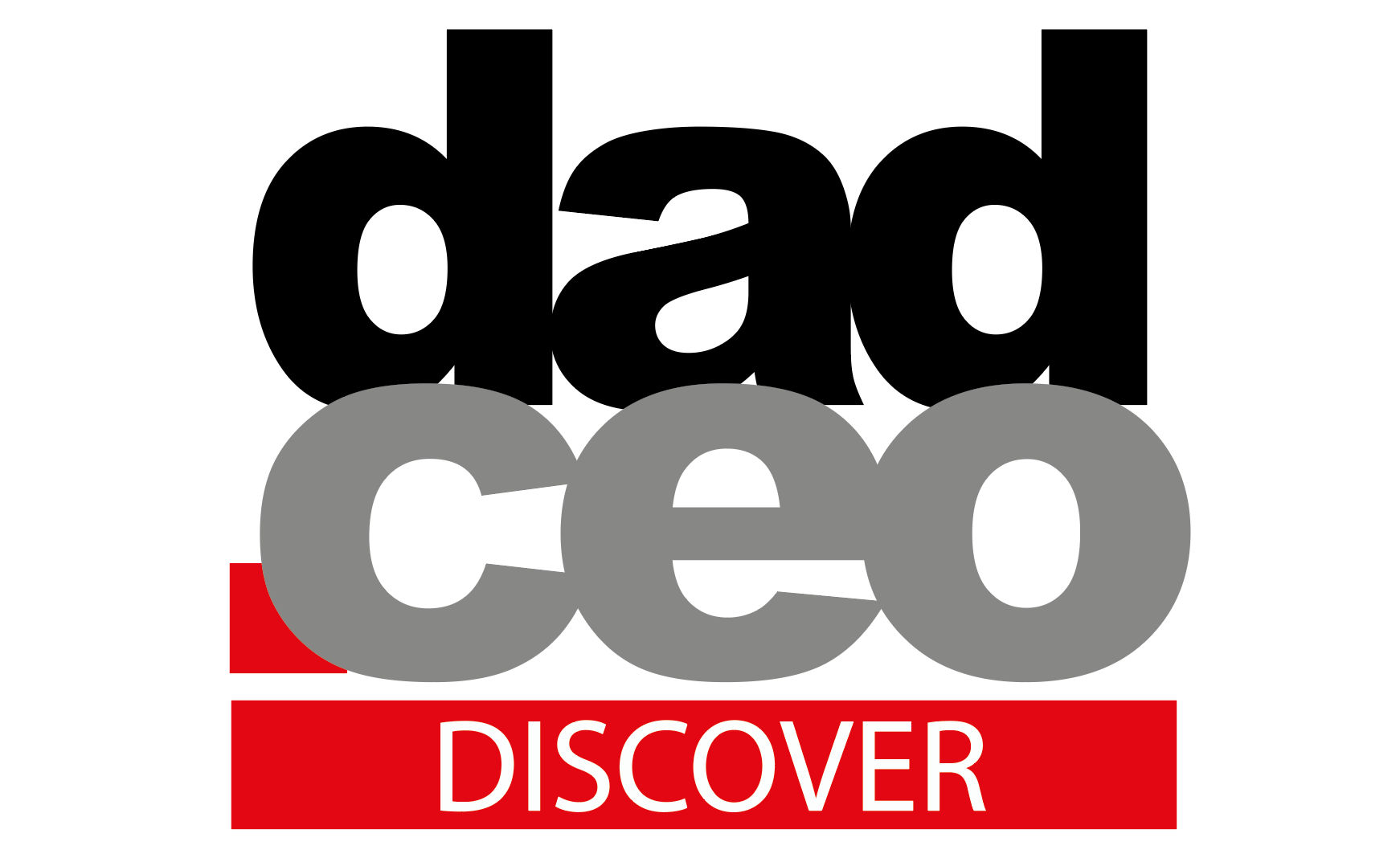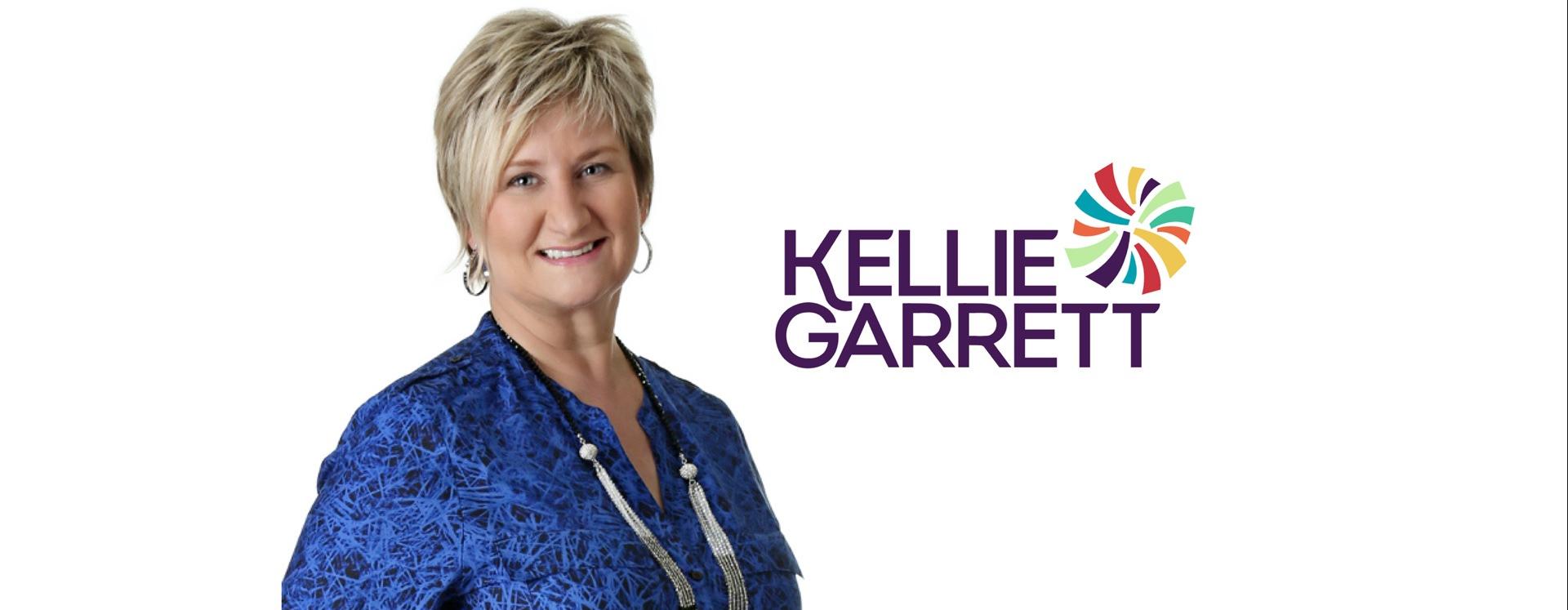MOM.CEO recently had the great pleasure to virtually sit down with Kellie Garrett, a certified and highly sought-after senior Executive Business Coach and Speaker who has been recognized as one of Canada’s Top 100 Most Powerful Women and Top 25 Most Influential.
MOM.CEO: The word NO is a powerful word in business, but does it work as well in your home or is it the opposite of YES?
Kellie Garrett: I have a sign on my desk that says, “JUST SAY NO!”. I am such a possibility-oriented person that I have a tendency to say yes to every opportunity or invitation that comes up – in both my business and personal life. I am learning (slowly) that every ‘NO’ frees up time for what truly feeds my soul. I am much more mindful of what I let go vs what I pursue.
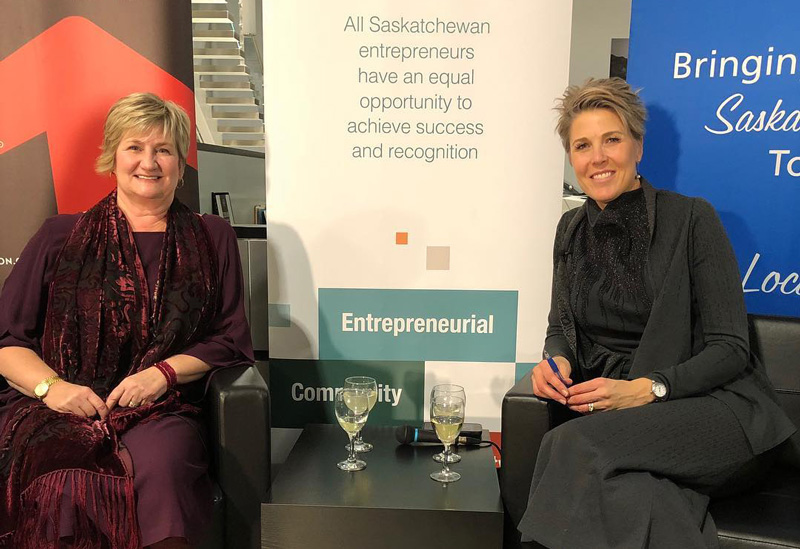
Kellie Garrett being interviewed by Lisa Peters
MOM.CEO: It’s clear that having a business coach has many benefits for a CEO in his/her work approach… but what about the advantages of balancing work/life issues?
I think a coach can help a CEO and other clients examine what’s right for them. There is no prescription that works for everyone. The key is to help the client identify what is and isn’t working about the current state, and what they aspire to in terms of life balance. Digging into the root causes of overwork can be helpful. For example, perfectionists feel that nothing is ever good enough. When they understand how to slay that dragon, they can get better at understanding when they are holding themselves and others to impossible standards, which allows them to be better leaders who work less.
Productivity hacks are another area where coaches can help. When is your energy highest? Tackle the hard things then. That one tip changed my life. Before, I would do all of the administrivia stuff first and work on mentally demanding tasks in the evening when I was tired. But even with the best tips available, executive jobs are consistently demanding. Freud said, “Imbalance is part of the human condition”. I have never been a fan of the term ‘work-life’ balance. I think work is a big part of life, so I prefer to call it ‘life balance’.
I once read somewhere:
"If you’re a passionate person who is driven by curiosity, then you’ll never have balance, and that’s okay."
My dear father always said that life is a trade-off. If you want to be a senior executive, you’re going to need to work… a lot! If you want to be an entrepreneur, you’re going to forsake a regular paycheque. If you’re a parent, you have built-in obligations to your children. Whatever your situation, you need to decide what areas of your life you’re going to focus on and which ones are going to have to give. In addition, different phases of life have different demands. For example, new parents have virtually no time for anything other than childcare and work. That’s okay, it will balance out in the long term.
P.S. There’s a great article in Fast Company called “Balance is Bunk!” https://www.fastcompany.com/51149/balance-bunk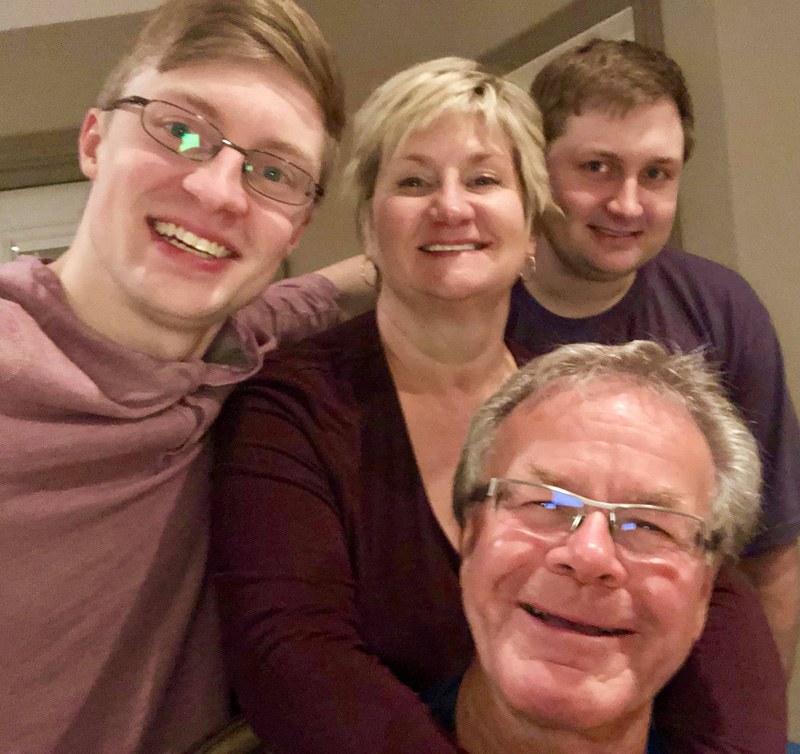
Kellie's family
MOM.CEO: You rose to a very high position and then decided to change course to become an Executive Coach. Can you tell us about this journey and what led you to make such a bold move?
Kellie Garrett: I left my executive job at age 53. It was simultaneously tough and easy… Tough because I come from very modest circumstances. I was earning what some would consider a lot of money, it seemed irresponsible to give up 35% of my pension by leaving seven years before turning 60. I still liked my job, my teams, and the work itself. But my heart was calling for change.
I have an autistic son and we wanted to provide a trust for him. We crunched the numbers and decided that we would be fine. Money is important to fulfill your obligations, but once you’ve looked after those, you need to ask yourself,
“What is enough? How much do I really need to be happy?"
What was relatively easy about the decision was a sense of my mortality. I was feeling the passage of time. My mother died at 48 from breast cancer. None of us know how long we have on this earth. In addition, my husband is 11 years older and I wanted more time with him.
But most of all, what really drove me to quit was a feeling that I had done all I could do to make a difference at my work and that it was time to pursue more freedom (my number one value) and creativity, and to do what really fed my soul. I had started coaching five years earlier and loved it. I already was speaking to audiences beyond my job and reveled in that. So I jumped to become CEO of my own company. Although it wasn’t part of the plan, I now earn more than I did as an exec and work less!
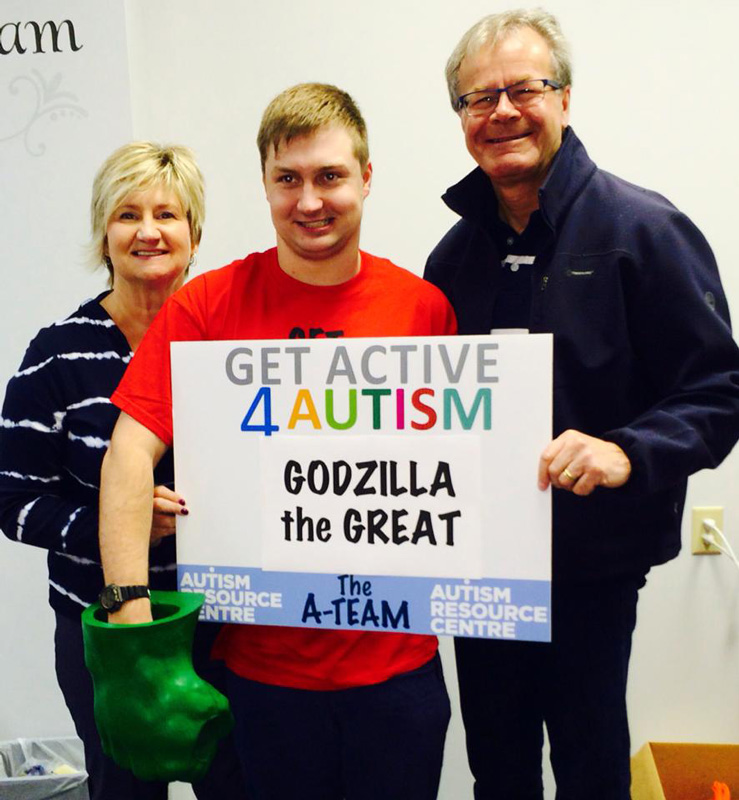
Supporting their son Connor and his team 'Godzilla the Great' in raising money for the Autism Resource Centre
MOM.CEO (follow-up question): Can you give some business coaching advice on someone who might be considering a career change – even though they are now at the top of the company they are at?
Kellie Garrett: It’s such an individual journey to decide to jump. Many of us in very senior positions equate who we are with what we do and underestimate the shock to the system when all of the respect, power, and perks you’re used to suddenly vanish. Having a plan for the transition is very important. In my case, I’d pursued coaching certification and also became a certified board director. I was already a speaker and had a large network. I planned to take a few months off and then launch my business, focusing on coaching, speaking, and directorships.
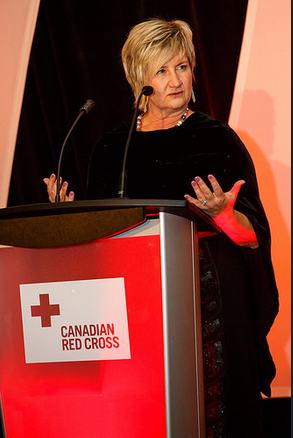
Public speaking is an integral part of Kellie Garrett's demanding schedule
If you want to leave your job and plan to start a business, what skills and experience can you leverage? How will you find clients? How much do you want to work? If you want to fully retire, how will you derive meaning in your new life?
Another issue to weigh is the financial impact. As mentioned above, it’s not the only issue, but it is significant. What will your financial situation be if you walk away from your executive position? What impact will it have on your lifestyle? What do you need versus want?
MOM.CEO: As an elite business coach, what top 3 tips would you give to a leader who feels they need to a reboot at work and at home?
Kellie Garrett: If you feel you need to reboot, it may be because:
1. You are depleting your energy stores and not taking time to rejuvenate.
2. You’re not living in sync with your values.
3. You’re not living a life congruent with your soul’s purpose.
Number one is much easier to address than number two. I read a great book years ago called The Power of Full Engagement. Authors Loehr and Schwartz argue that we need to pay attention to our various sources of energy and they offer practical strategies to do so. This is similar to the notion expressed in an Indian proverb:
“Everyone is a house with four rooms, a physical, a mental, an emotional and a spiritual. Most of us tend to live in one room most of the time but, unless we go into every room every day, even if only to keep it aired, we are not a complete person.”
- Rumer Godden, A House with Four Rooms.
Most executives I coach spend virtually all of their time in the realm of the intellectual and emotional. (Even if they don’t view themselves as emotional, I remind them that frustration, anxiety, boredom and so on all are emotions.) They lament that they don’t have time for exercise and many don’t have a spiritual practice. The latter doesn’t have to be part of organized religion. It can be taking a walk in nature or journaling. We stunt ourselves when we don’t spend time in the four rooms. A reboot involves doing that.
Re point number two: It is easy to get caught up in the energy of the people around us. When we are working in a toxic work culture, we may in fact start contributing to it by becoming critical and talking behind others’ backs. If that runs counter to our values, it creates cognitive dissonance and eats at us, draining our energy. In Brené Brown’s excellent book Dare to Lead, she says that living into our values is one of the skills of courageous leaders. That requires a hard reckoning with ourselves, tuning into when we are not. It’s tempting to externalize blame, but there is much that we can control, starting with our own behaviours and reactions. When I am at peace with how I conduct myself, my energy is much higher.
Re point number three: What feeds your soul? Sometimes we lack energy or enthusiasm in our lives because what we spend most of our time on doesn’t jive with our gifts and what we’re meant to be. The older we get, the more we need to have congruence between who we really are and what we spend our days on – at work and at home. Answering this question can kick start some hard life choices.
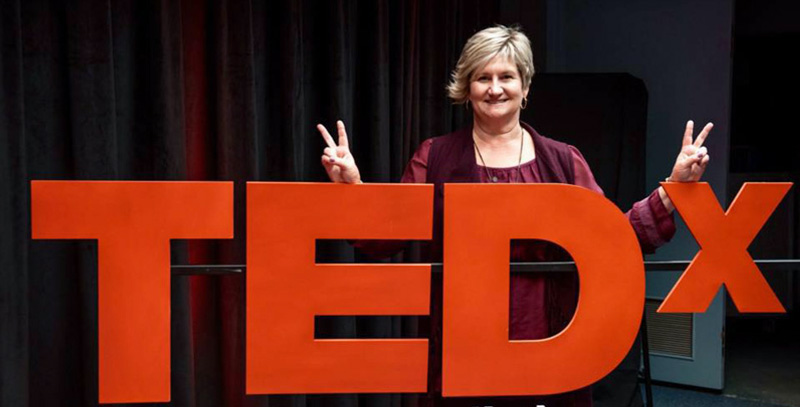
Kellie Garrett speaking at a TEDx event in Canada
MOM.CEO: You have a new book coming out. Can you tell us about this?
Kellie Garrett: My book’s working title is Leaderly, a coach approach to leadership. It’s about how to slay your dragons so that you can consistently put your higher self in the driver’s seat – in every area of your life. I call that acting ‘leaderly’. We need more leadership in the world that is not tied to title. We all know bosses who don’t act very leaderly at all, and others who aren’t very high up in the hierarchy who inspire everyone around them. We need to demonstrate leadership well beyond work – in our marriages, with our exes, with our children, in our communities. My book will share ideas on how to do that, using techniques to coach yourself.
MOM.CEO: Can you share with us the most challenging situation you had to face as an executive and how it helped make you a better mother?
Kellie Garrett: I had several 360s over the course of a year with feedback about my strong presence and intimidating quality. It blew my mind. I simply couldn’t see it. I asked my kids (who were then eight and nine) to tell me what they thought I had to improve. They both told me that I wasn’t patient, that I was hard to argue with, and that I was scary sometimes. Yikes! I realized that not only were they were right, that their feedback was similar to my 360.
I started working harder at listening, not speaking first, and putting people at ease. It made me a better boss and a better mother. This is only one example.
I’ve noticed that many people freak out when they receive a 360 and zero in on the negative parts. They then try to suss out who criticized them and find ways to dismiss the feedback. That’s perfectly natural, but it’s important to get past the hurt feelings and mine the gold in the criticism. The best jumps in my evolution as a leader and a human have resulted from tough feedback or hard situations.
MOM.CEO: What did you sacrifice in order to be an impactful leader while raising children and do you have any regrets?
Kellie Garrett: Being in a senior position is very demanding. I was a workaholic for many years, so I sacrificed spending enough time with my kids and husband at times, and certainly didn’t spend enough time looking after my physical self. At the time, I rationalized that I was fully present when I was with my children, even though I didn’t spend as much time with them as some parents. I now know that I wasn’t as present as I’d thought, so that’s one regret.
Another regret is that I didn’t spend much time one on one with my kids – usually, it was with both of them. I think kids reveal different sides of themselves when they have time alone with a parent.
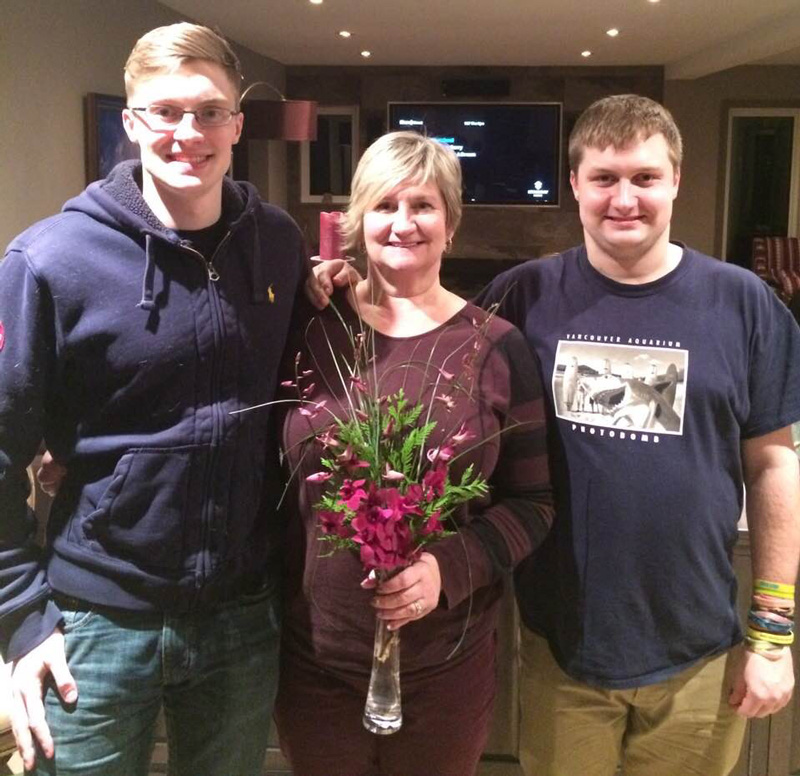
Kellie Garrett with her sons, Max and Connor
MOM.CEO: Do you feel that MOM.CEOs have it harder at balancing their work/life duties than DAD.CEOs?
Kellie Garrett: I think that our society is getting better at equality. Many men are now fully involved in parenting and household chores. I was lucky. Both of my husbands were completely into both, which I recognize is not the norm for my age (I’m 60).
Although things are getting better equality wise, a lot of women have unrealistic expectations on the home front. They want a perfect home and many have high standards of cleanliness. I never desired either, so it was easier for me. Having little kids involves a certain amount of chaos. Every couple has to find their way and negotiate what is fair in terms of rearing children and running a house.
MOM.CEO: As a coach and a leader, what are your top 5 tips for being a successful MOM.CEO?
Kellie Garrett:
1. Let go of perfection: It’s an illusion and will just drive you crazy. Choose what deserves to be of the highest standard and choose ‘good enough’ for the rest. A successful business strategy involves doing just that. You’re not going to invest a large number of resources on things your customer doesn’t want. Focusing on developing your people’s potential and inspiring them warrants a high standard as does work that will forward the business. Spending high-quality time with your partner and your kids deserves your priority. Everything else needs a ‘git ‘er done’ mentality.
2. Look after yourself – physically, emotionally, mentally, spiritually: you will be a much more effective leader, mother, and partner if you are rested and grounded. Sacrificing sleep is super tempting when you have too much to do and you crave time to yourself once the kids are in bed. It’s not worth it. Everything is easier when you are rested. Finding time for solitude and rejuvenation isn’t a luxury, it’s a must – even if it’s just 10 minutes in the bathtub or alone with your coffee and a journal in the morning. Negotiate time away from the kids and your partner (if you have one), even if it’s for an hour or two a week. Go out with friends and laugh.
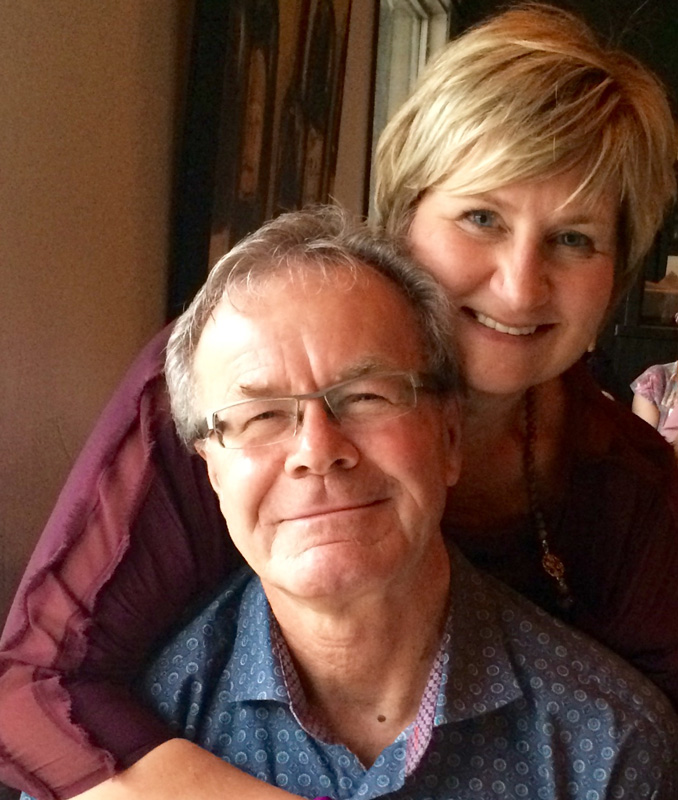
Kellie and her husband Jay
3. Understand that most of your flaws are just overplayed strengths – this will help you to play with the throttle instead of beating yourself up. When we focus on what we’re not good at, it can feel overwhelming and insurmountable. When we realize that it’s just on a continuum, it’s more hopeful. I am strong, very direct, and sometimes dominating. That’s great when I’m on a stage giving a speech. It’s damaging when I’m in a meeting and taking over, or in an argument with loved ones. I have learned to ask more questions and to refrain from saying exactly what I think too quickly. I used to think,
“Well, I just can’t be myself.”
Now I know that being myself doesn’t give me a license to take over. Others are very introverted and thoughtful, so they need to push themselves to go full throttle, well beyond their comfort zone, to ensure that their voice and ideas are heard.
4. Trust more and forgive: Working with other humans inevitably means that misunderstandings occur. When trust is broken, many of us have a hard time moving on, so we write off the relationship. We may act okay with someone we don’t trust, but we’re really not. Holding grudges is lousy for you and gets in the way of true collaboration. Find a way to grant the other person some grace and work on understanding his or her perspective. Sometimes you’ll find out that you have unconsciously done something that eroded trust. Highly successful people are very good at building and rebuilding trust.
5. Lighten up. Most of us aren’t brain surgeons or rocket scientists. If we or someone on our teams makes a mistake, it’s usually not earth-shattering. Unfortunately, we may act like it is. When you’re a driven, bright, high-performing person, your whole world starts revolving around work. You’re not going to get the best out of your employees or yourself if you take everything too seriously. Find a way to have fun at work and outside of it. Life is too short to fret over every little thing.
MOM.CEO: Psychologists say most of us adopt different personas at home or at work. Navigating between our two selves can undermine our authentic sense of self and create stress.
Kellie Garrett: There are obviously boundaries that need to be in place whether we’re quite different at home or not that different. Those who tend to be more formal and who like to come across as having it all together may find it tough during this time of COVID-19 when a cat walks across their desk or the neighbor starts sawing wood outside their window. I am good at laughing when these things happen, but I’m an informal person. I think that the transitions between the two worlds are hardest for those who are juggling work from home while trying to parent and home school children, especially if you’re a single parent or your partner is also working from home.
I am coaching a high-powered executive right now who has high expectations of her partner because his job isn’t as senior as hers. They’re experiencing conflict because he still has a job to do. The pandemic has thrown existing issues and beliefs into relief, and now we’re forced to address things that may have been simmering for a while. That can become very stressful.
"Cutting each other some slack when someone’s frustrated or anxious is a very good thing."
ABOUT KELLIE GARRETT
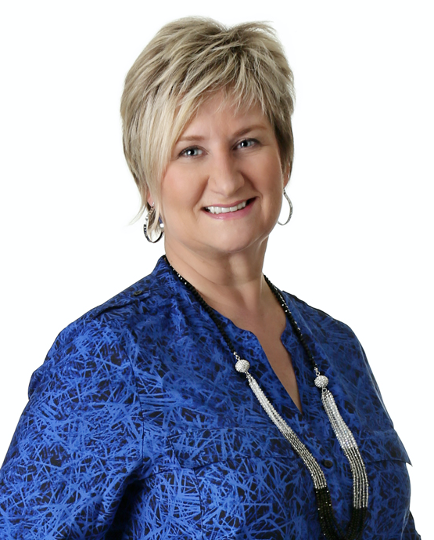
Kellie Garrett describes herself as a recovering executive.
Formerly a senior VP responsible for business strategy and reputation management, she left the corporate world in 2013.
She is now CEO of a thriving business, offering executive coaching, speaking, and consulting on leadership, culture transformation, and employee engagement. She is also a certified board director who is an expert on governance and board dynamics.
Kellie is a Certified Dare to LeadTM Facilitator, qualified to teach the work of Dr. Brené Brown.
Awards include Canada’s 100 Most Powerful Women, Top 25 Women of Influence, Red Cross Humanitarian Award (SK), and the Sovereign’s Medal for Volunteers for her work on autism advocacy.
Kellie lives in Regina, Saskatchewan with her husband Jay. She has two children – Max (29) and Connor (27). Connor has autism and is leading a fully independent life.
Kellie loves flower gardening and quaffing wine with her family and friends.

